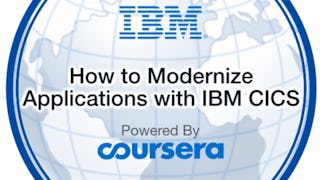- Browse
- C Programming
Results for "c programming"
 Status: Free TrialFree TrialC
Status: Free TrialFree TrialCCisco Learning and Certifications
Skills you'll gain: Software-Defined Networking, YAML, Network Architecture, Network Protocols, Network Routing, Computer Networking, Data Modeling, Extensible Markup Language (XML), JSON, Automation, Application Programming Interface (API)
4.8·Rating, 4.8 out of 5 stars13 reviewsIntermediate · Course · 1 - 4 Weeks
 Status: PreviewPreview
Status: PreviewPreviewSkills you'll gain: Transaction Processing, Hybrid Cloud Computing, COBOL (Programming Language), Mainframe Technologies, Mainframe Computing, IBM Cloud, Cloud Applications, Enterprise Application Management, Application Servers, Application Development, Application Programming Interface (API), Middleware, Business Logic
4.5·Rating, 4.5 out of 5 stars16 reviewsIntermediate · Course · 1 - 4 Weeks
 Status: NewNewStatus: Free TrialFree Trial
Status: NewNewStatus: Free TrialFree TrialSkills you'll gain: Data Analysis, Statistical Analysis, Probability Distribution, R Programming, Exploratory Data Analysis, Statistical Modeling, Machine Learning, Statistical Inference, Classification Algorithms, Data Manipulation, Supervised Learning, Random Forest Algorithm, Regression Analysis, Model Evaluation, Decision Tree Learning
4.5·Rating, 4.5 out of 5 stars11 reviewsMixed · Course · 1 - 4 Weeks
 Status: Free TrialFree TrialX
Status: Free TrialFree TrialXXi'an Jiaotong University
Skills you'll gain: Operating Systems, Computer Systems, Debugging, Microsoft Visual Studio, OS Process Management, Computer Hardware, C# (Programming Language), Computer Architecture, Object Oriented Programming (OOP), Programming Principles, Integrated Development Environments, Computational Logic, System Design and Implementation
3.9·Rating, 3.9 out of 5 stars40 reviewsMixed · Course · 1 - 4 Weeks
 Status: NewNewStatus: Free TrialFree TrialA
Status: NewNewStatus: Free TrialFree TrialAAI Business School
Skills you'll gain: Prompt Engineering, Responsible AI, Risk Management, AI Security, Generative AI, AI Enablement, Artificial Intelligence, Financial Services, LLM Application, AI Workflows, Finance, Automation
3.9·Rating, 3.9 out of 5 stars16 reviewsBeginner · Course · 1 - 4 Weeks
 Status: NewNewStatus: Free TrialFree TrialM
Status: NewNewStatus: Free TrialFree TrialMMathWorks
Skills you'll gain: Generative AI, LLM Application, Matlab, Code Review, Software Documentation, Visualization (Computer Graphics)
4.7·Rating, 4.7 out of 5 stars9 reviewsBeginner · Course · 1 - 4 Weeks

Skills you'll gain: Object Oriented Programming (OOP), Jupyter, Computer Programming, Python Programming, Simulation and Simulation Software, Electronics Engineering, Simulations, Programming Principles
4.7·Rating, 4.7 out of 5 stars25 reviewsBeginner · Guided Project · Less Than 2 Hours

Skills you'll gain: Angular, Authorization (Computing), JavaScript Frameworks, Network Routing, Application Programming Interface (API), TypeScript, Javascript, Web Development
4.9·Rating, 4.9 out of 5 stars17 reviewsAdvanced · Guided Project · Less Than 2 Hours
 Status: FreeFree
Status: FreeFreeSkills you'll gain: Responsive Web Design, HTML and CSS, Web Design, Web Design and Development, Cascading Style Sheets (CSS), Front-End Web Development, User Interface (UI), Browser Compatibility, Javascript, Mobile Development, Interactive Design
4.5·Rating, 4.5 out of 5 stars26 reviewsIntermediate · Guided Project · Less Than 2 Hours
 Status: Free TrialFree Trial
Status: Free TrialFree TrialSkills you'll gain: React.js, Cascading Style Sheets (CSS), Event-Driven Programming, User Experience Design, User Interface (UI), Front-End Web Development, Data Management, JavaScript Frameworks, Javascript, API Design, Data Validation, Real Time Data, Web Development
Intermediate · Course · 1 - 4 Weeks
 Status: Free TrialFree TrialU
Status: Free TrialFree TrialUUniversity of California San Diego
Skills you'll gain: Algorithms, Programming Principles, Computational Thinking, Program Development, Code Review, Software Documentation, Debugging, Technical Communication
Beginner · Course · 1 - 4 Weeks
 A
AAmazon Web Services
Skills you'll gain: Root Cause Analysis, Customer Relationship Building, Customer Relationship Management, Problem Management, Verbal Communication Skills, Customer Support, Amazon Web Services, Communication, Cloud Solutions, Technical Support, Cloud Security, Cloud Services, Automation, Collaboration, Incident Management, Generative AI, Innovation
4.9·Rating, 4.9 out of 5 stars26 reviewsBeginner · Course · 1 - 4 Weeks
In summary, here are 10 of our most popular c programming courses
- Introducing Model-Driven Programmability: Cisco Learning and Certifications
- How to Modernize applications with IBM CICS: IBM
- Machine Learning with R: Build, Analyze & Predict: EDUCBA
- 系统平台与C#程序基础: Xi'an Jiaotong University
- Introduction to AI for finance professionals: AI Business School
- Introduction to MATLAB Copilot: MathWorks
- Aprendiendo Python con circuitos digitales: Coursera
- Learn Angular Routing by building a Cocktails Application: Coursera
- Create a responsive seat selector UI in HTML, CSS, and JS: Coursera
- React Technical Interview Practice Questions: Scrimba










